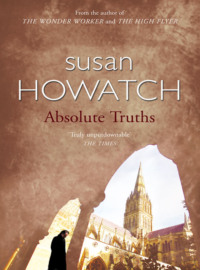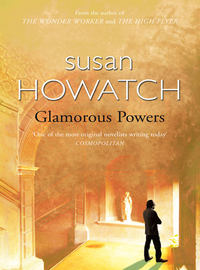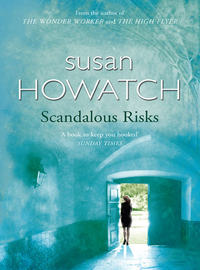
Полная версия
Ultimate Prizes
Grace was ordered to lie down on the moth-eaten material which covered the sofa. Christian was dispatched to make a second attempt to find something which resembled a lavatory. Norman and James were sent upstairs to make the beds. Primrose was given an apple, left over from our picnic lunch, and put in charge of Sandy. In the picnic-basket I also found a half-eaten roll which I stuffed into Sandy’s mouth to keep him quiet. Then having assembled some logs from a pile which I found outside the back door I lit the kitchen range with the aid of an old newspaper which I found on the filthy floor of the larder. As I morosely watched the feeble smouldering of the logs I tried not to remember that a mere week ago I had been dining in the height of luxury at Starmouth Court.
‘I’ll make some tea,’ said Grace, struggling nobly from the sofa.
‘No, you stay exactly where you are.’ I filled the kettle, found the ration we had brought with us and unearthed a teapot from a cupboard which stank. Meanwhile Christian had returned to report the existence of a privy and Norman was shouting from upstairs that there were no sheets but plenty of blankets. We appeared to be making progress.
‘Take the suitcases upstairs and start unpacking,’ I said to Christian. ‘Do Sandy’s first.’
‘That infant smells as bad as the privy,’ remarked Christian, who was fastidious.
‘Why do you think I told you to unpack his bag first? We need a clean nappy.’ I had taken a plate from the dresser and was now busy extracting some spam from a large tin.
‘I’ll find the nappy,’ said Grace, making a new effort to struggle to her feet.
Sandy started to roar again.
‘I simply can’t understand,’ observed Christian languidly, ‘why infanticide isn’t more common.’
‘What’s infanticide?’ said Primrose as Christian and Grace trailed away upstairs together.
‘Baby-killing, my love.’ I opened two large cans of baked beans just as the kettle showed signs that it might one day come to the boil. Sandy was still roaring but when I gave him a baked bean he spat it out. Turning back to the table I found that the spam was being investigated by a mouse. Without thinking I snarled: ‘Bugger off, you bally blighter!’ – a response which avoided blasphemy (just) but was hardly a fitting exclamation for a clergyman. In a paroxysm of rage I hurled a spoon, but the animal merely frisked down the table-leg and scampered to safety across the floor. Primrose screamed. Sandy stopped crying and immediately began to chant: ‘Bugger, bugger, bugger!’ with zest. (Why is it that small children have such an unfailing talent for picking up bad language?) Seconds later Christian, Norman and James, all waving nappies, clattered down the stairs to inform me that Grace had had to rest again as she was feeling faint.
‘Well, don’t just stand there waving nappies as if they were Union Jacks! Get some cotton wool and the talcum powder – and some lavatory paper might be useful too, if one can judge by the smell –’
‘There isn’t any lavatory paper,’ said Christian.
‘Nonsense, there must be.’
‘I don’t feel very hungry,’ said Norman, eyeing the spam. ‘This conversation’s putting me off my food.’
‘Rubbish – stop being so feeble!’ I said with a robust good humour which bordered on the saintly. ‘Is that the spirit which built the Empire?’
‘Daddy,’ said Primrose, ‘I think the mouse went to the lavatory on the table.’
‘Bugger, bugger, bugger!’ shouted Sandy.
‘I think I’m going to be sick,’ said Norman, bolting for the back door.
‘Who taught Sandy to say bugger?’ demanded Christian in delight as he searched the kitchen cupboards for lavatory paper.
‘Daddy, did you hear me? I said: “I think the mouse – ”’
‘Yes, my love. Pass me that rag hanging by the sink, please.’
‘Neville.’ Looking up I saw Grace, white as a winding-sheet, in the doorway. She was carrying the cotton wool and the talcum powder. ‘I’ll change Sandy.’
‘Very well,’ I said, deciding that this was the moment when I would be ungrateful if I continued to refuse my wife’s noble offers of help, ‘but afterwards you’re to go straight to bed – and let’s hope there are no bedbugs.’
‘I simply can’t understand how the Church Gazette could have allowed –’
‘It’s not the fault of the Church Gazette. One can’t expect them to inspect all the properties they advertise. The fault was mine for not immediately realizing that “old-world charm” meant “no modern conveniences”.’
‘Gaudeamus igitur!’ cried Christian, flourishing a roll of toilet paper.
‘Christian, stop behaving like a precocious undergraduate and stir the baked beans. James, go outside and see if Norman’s finished being sick.’
‘Is Norman ill?’ said Grace alarmed.
‘Daddy,’ said Primrose, ‘what are bedbugs?’
‘Bugger, bugger, bugger!’ shouted Sandy with zest.
Grace reeled. ‘Sandy! Christian, did you –’
‘No, Mother, not guilty, absolutely not. I say, these beans look a bit odd –’
‘Here’s Norman,’ said James. ‘I think he might be dying.’
‘I feel terrible,’ said Norman, looking like death.
‘It’s always so metaphysically interesting,’ mused Christian, very much the Winchester scholar, ‘when feelings so precisely mirror appearances.’
‘Shut up, you great big beastly brute!’ yelled Norman.
‘Enough!’ I barked as Grace started swaying in the doorway. ‘Grace and Norman – go to bed at once before you both pass out. Christian, make the tea. James, start spooning out the baked beans. Primrose, bring over those plates from the dresser. Sandy –’ I sighed and reached for the toilet paper. There were times when even I, a devout clergyman dedicated to preaching the joys of family life, was obliged to admit that being a husband and father could leave a lot to be desired.
V
‘Why can’t Sandy learn to do without nappies?’ asked Primrose later when the spam and baked beans had been consumed. ‘I gave up nappies when I was much younger than he is.’
‘All babies are different, my love.’
‘You may think you’re clever,’ said Christian to Primrose, ‘but I walked, talked, gave up nappies and translated The Iliad well before my first birthday.’
‘Show-off!’ retorted Primrose, who was a girl of spirit.
‘Did he really, Daddy?’ said James worried.
‘No, of course not!’
James who was nine, had begun to realize that he was not so clever as his older brothers, and I knew he was mortified that he never came top of his class. Unlike Christian and Norman, he would never lighten my financial burdens by winning a Winchester scholarship, but I thought in the end he would be happy enough; he was popular with his contemporaries and keen on cricket. In some ways he was the son with whom I felt most at ease. His sunny nature made him restful and his normality provided a soothing contrast to the intellectual pyrotechnics displayed by his more gifted brothers. In my judgement he was on course to becoming a thoroughly decent, presentable young man and I was very pleased with him. So much for James.
Primrose, now sitting next to me in her privileged position as the Only Daughter, was approaching her fifth birthday and would one day, I thought, prove to be a brilliant conversationalist; already she was fascinated by language and never missed an opportunity to expand her vocabulary. Since for a woman intelligence is less important than looks I spent much time worrying that she might wind up a blue-stocking, and it was with relief that I noted she showed signs of turning into a delectable blue-eyed blonde. I foresaw a splendid career ahead of her as a wife and mother, a prospect which filled me with paternal pride. So much for Primrose.
Sandy, now dozing against my chest, was going to be very clever, perhaps even as clever as Christian. When he was not indulging in his fondness for vulgar language he was capable of stringing together sentences of extraordinary quality for a child who was still little more than a baby. His latest masterpiece, delivered that day on the train, was: ‘Peter Rabbit has great sartorial elegance but I prefer the coat worn by Benjamin Bunny.’ Of course Christian had taught him the phrase ‘sartorial elegance’, but Sandy’s remarkable achievement lay not only in pronouncing the words but in using them correctly. I judged a Winchester scholarship inevitable and was already basking in delight. So much for Sandy.
Norman, now upstairs as he battled with his malaise, was twelve years old and engaged in a nonstop contest to prove he was as clever as his older brother. If James was the son with whom I felt most relaxed, then Norman was the son with whom I could most obviously sympathize; I too had spent my childhood in a nonstop contest with my older brother. It was a contest which I had won but which I suspected Norman was destined to lose, although he remained far too clever to give me cause for anxiety. He never failed to receive glowing school reports which made me sigh with satisfaction. So much for Norman.
Finally there was Christian, now sitting opposite me at the far end of the table. What can I say to convey the unique quality of this, the most extraordinary member of my family? I could never write ‘so much for Christian’ at the end of a brief description of him, because no brief description could convey more than the bare bones of his personality. Perhaps I can best capture the aura of glamour he exuded by stating that Christian was the idealized son which men so often dream of fathering but so rarely ever do. Christian was the self I would like to have been, a genetic miracle, my own self glorified. Exceptionally clever, blessed with the gift of reducing every classics master he encountered to a stunned admiration, talented at games, popular with his contemporaries, he was fifteen years old, still growing and evidently destined to be not only charming, witty and accomplished but tall, dark and handsome.
I regarded him with a deep, fierce, utterly private devotion which I was quite unable to articulate. I could be demonstrative with Primrose because men were allowed to show affection towards their daughters, but with my sons I had a horror of indulging in any behaviour which might be judged sentimental. The kindly authority I exercised had never included barbarous physical punishment, but no matter how much I wanted to demonstrate my affection I was unable to do more than produce an air of mild good will. In Yorkshire we don’t wear our hearts on our sleeves – and perhaps too I could never quite forget Uncle Willoughby declaring in 1909 that a sentimental father who slobbered over his male offspring was the kind of fool who inevitably wound up in an early grave.
‘Daddy …’
I returned to 1942 with a jolt. ‘Yes, James?’
‘After the war ends, what will happen to the newspapers? There won’t be any more news, will there?’
‘There’ll be blank pages edged in black,’ said Christian, ‘to mark the utter cessation of journalism. But who says the war’s going to end? As far as I can see it’s all set to go on for ever.’
‘Nonsense!’ I said roundly. ‘Think of Napoleon! Once he attacked Russia he was finished – the British army merely had to mop him up at Waterloo.’
‘I wish the British army would start mopping up Rommel in the Desert.’
‘Daddy,’ said Primrose, ‘why aren’t you in the army?’
‘The Bishop said he couldn’t spare me from my work in Starbridge. Not all clergymen are called to serve God in the army, even in wartime.’
Christian said suddenly: ‘Do you ever regret abandoning your pacifism after Munich?’
‘Sometimes. I still believe pacifism is intellectually consistent with Liberal Protestantism, but unfortunately Herr Hitler doesn’t leave much room for intellectual consistency.’
‘I’m beginning to think it’s Liberal Protestantism which doesn’t leave much room for intellectual consistency. How can you play down evil and maintain your optimistic view of the universe when you’re confronted with a catastrophe like Nazism? I mean, what do you do with someone like Adolf Hitler? You can’t simply pat him on the head, cite the compassion and forgiveness of Christ and say cosily: “Go thy way and sin no more!”’
I was much taken aback. I had to remind myself that fifteen-year-old adolescents were notorious for questioning their parents’ views. ‘I’ll tell you exactly what you do with someone like Hitler,’ I said abruptly. ‘In practical terms you fight him. And in spiritual terms you pray for him and remember that there’s a divine spark in every human being.’
‘But isn’t that hopelessly idealistic? Isn’t that out of touch with the reality of the evil going on here? Try talking to the Jews about Hitler’s divine spark!’
‘Idealism is also a reality – the reality to which we must all continually aspire.’
‘Yes, but –’
‘Christian, I’ve had a long hard day, I’ve wound up in a hovel and quite frankly I’m not in the mood to discuss theology. Can we continue this debate later?’
‘I’m sorry, I just wanted to have a real conversation with you for once.’
I stared at him. ‘But we always have real conversations!’
‘No, they’re usually about Latin and Greek and how well I’m doing at school.’
‘Well, what’s so unreal about all your splendid successes?’ I stood up with one arm encircling Sandy and held out my free hand to Primrose. ‘Bedtime, my love,’ I said to her, ‘and let’s hope that tomorrow morning after a good night’s sleep we’ll find our holiday taking a turn for the better.’
‘It could hardly get much worse,’ said Christian.
But he was wrong.
VI
Norman’s condition showed no improvement the next morning. Grace – perfect as always – had remembered to bring a thermometer, and when we discovered he had a high fever I trekked to the nearby village in search of a doctor. Influenza was diagnosed. Grace was obliged to spend most of her time caring for the invalid. The weather was not only wet but cold. The younger children quickly became fractious.
It was on the fifth day after our arrival, just as Norman’s condition began to improve, that Grace fainted. Rushing upstairs in response to Norman’s frightened yell for help, I found she had collapsed on the bedroom floor.
‘I haven’t felt well for some time,’ she whispered later, ‘but I was afraid you’d think it was the last straw if I couldn’t cope.’
When the doctor returned he ordered her sternly to stay in bed. Afterwards he told me that she had probably made matters worse by ignoring all the signs that she had caught Norman’s influenza.
But Grace did not have influenza. She had caught a chill after being soaked on a shopping expedition – it could never have happened in Devon where the village shop stood next door to our cottage – and now she was suffering from pneumonia.
At eleven o’clock that night she began to have difficulty with her breathing. On arrival the doctor took one look at her and said: ‘She must go to hospital at once.’ He made no attempt to summon an ambulance. He drove us to the hospital at Keswick in his own car. I remember thinking what a blessing it was that Christian was old enough to be left in charge at the cottage.
Soon after she was admitted to hospital she became delirious and the pneumonia was finally diagnosed. I telephoned her sister Winifred in Manchester. To my great relief she at once offered to come to my rescue. I was unable to leave the hospital, and although Christian was capable of taking charge of four children for a short time I could hardly leave him without assistance for more than twenty-four hours.
The day passed. Winifred arrived and could barely bring herself to leave the hospital. I had to remind her sharply that if she wanted to help her sister she should attend to the children. Winifred cried but left. More time passed. The sympathetic nurses offered me cups of tea but I could hardly drink. Eating proved quite impossible.
For some time Grace was unconscious but in the evening when the sun was setting far away in the other world beyond the hospital walls, she opened her eyes and said clearly: ‘I can’t go on. But I must. She’d never care for the children.’
For a long moment I was so appalled, so overpowered by my guilt and my shame that I was unable to speak. Then leaning forward I clumsily clasped her hands as if I could somehow infuse her with strength, and stammered: ‘You mustn’t say such things. You mustn’t even think them. I love you and no one else but you and you’re going to live.’
She died a minute later.
FIVE
‘Passion may be dangerous, but for all that it is the driving-force of life …’
CHARLES E. RAVEN
Regius Professor of Divinity,
Cambridge, 1932–1950
A Wanderer’s Way
I
Instinctively I knew that my best chance of maintaining an immaculate self-control was to organize the chaotic aftermath of the tragedy with the efficiency of the born administrator. I dealt with the hospital personnel. I made the necessary urgent telephone calls. I drew up a list of the other essential matters which required my attention. I prepared a short speech to deliver to my children and memorized it; I even bought extra handkerchiefs to mop up all the tears.
After dealing with the children I dealt with the local vicar who called in performance of his Christian duty, and I dealt with Winifred who by this time was well-nigh prostrated by her shock and grief. Having drafted the notices for The Times and the Daily Telegraph I wrote the innumerable necessary letters and decided which of Grace’s favourite hymns should be included in the funeral service. I was ceaselessly active. Sleep was shunned as far as possible because I was afraid of what might happen when I could no longer control my thoughts. From past experience I knew that if one wanted to preserve one’s sanity in adverse circumstances one had to ring down the metaphorical curtain in one’s mind in order to hide the horrors which had taken place onstage, and how could one be sure of keeping the curtain down once sleep had impaired one’s ability to play the stage manager?
After a while I realized that the curtain was trying to rise even when I was fully conscious, and I became engaged in a deadly struggle to keep it in place. It tried to rise when Christian stammered: ‘How could God have allowed such a dreadful thing to happen?’ and although I embarked on an answer I found I was unable to complete it as I would have wished. I did manage to say: ‘In a world where nothing bad ever happened we’d be mere puppets smiling at the end of manipulated strings,’ but then the curtain began to rise in earnest and I could not speak of the great freedom to be, to love and, inevitably, to suffer which made us not unfeeling puppets but human beings forever vulnerable to tragedy. Instead all I could say was: ‘We’ll talk about it later,’ as I struggled to nail my curtain to the ground.
But no sooner was the curtain back in place than Winifred was exclaiming in a burst of detestable feminine emotion: ‘Neville, you don’t deserve this – you were such a devoted husband, and everyone always said what a wonderful example you and Grace were of a truly Christian marriage!’
Once more the curtain started to rise and once more I managed to grab the hem before it could sail out of reach. I said woodenly: ‘Tragedy’s so difficult to discuss, isn’t it? Better not to try,’ and with a mighty effort of will I heaved the curtain down, but I was to have no respite. The curtain was developing a sinister life of its own.
‘Are you sure Mummy’s happy with Jesus?’ said Primrose. ‘No matter how nice Jesus is, I think she’d be happier with us,’ and a second later my nurse Tabitha was saying in 1909: ‘Your Pa’s gone to heaven to be with Jesus.’ Then in my memory I heard Willy cry outraged: ‘How dare he!’ while Emily asked: ‘When will Jesus let us have him back?’ A world had ended then and a world had ended now, the new tragedy eliding with all my most terrible memories as the curtain began to go up and up and up … But I hung on to the hem with my last ounce of strength and doggedly refused to let go.
The funeral service was held at St Martin’s-in-Cripplegate before the private interment at the cemetery, and when the Bishop himself offered to help I was spared the task of finding another clergyman to take the service I would have been unable to conduct. The ancient church, originally founded for the benefit of the workmen who were building the Cathedral, was packed with mourners, and the small graveyard too overflowed with those wishing to pay their respects.
The Bishop was superb. Dr Ottershaw had his episcopal shortcomings; as his Archdeacon I knew them better than anyone, but he was a good, decent man, and in his goodness and his decency his Christian message of hope lightened the darkness which must always surround the mystery of suffering. There were no sentimental clichés from Dr Ottershaw, only profound religious truths expressed with exquisite simplicity, and I felt not only relieved but grateful that my children were at last able to hear the message which my fear of emotional breakdown had prevented me from giving them.
It occurred to me that my disciple would have soaked at least one handkerchief as she listened to the Bishop, but of course I could not allow myself to think of Dido.
I glimpsed her before the service and she spoke to me afterwards, but only the briefest of conversations was possible. After the exchange of greetings she merely said: ‘I’ll write, I promise. I was too upset to write before,’ and as she disappeared I saw her eyes shone with tears. Perhaps she was merely feeling emotional in the wake of Dr Ottershaw’s address, but perhaps too she was temporarily overcome with all manner of ambiguous feelings.
After the concluding rites in the cemetery I continued to deal with everyone who required my attention until at last, much later, I found myself alone with my brother and sister in the vicarage kitchen as my curtain once more tried to rise. I was struggling fiercely with the hem but to my terror I realized it was sliding out of my grasp. I thought: I mustn’t look at the stage, can’t look, won’t look, no one can make me look. Then I suddenly realized I had spoken the words aloud. As Willy and Emily looked at me appalled I muttered: ‘Sorry. Mind wandering. Very tired,’ and covered my face with my hands.
Emily said drearily: ‘I’ll make you some tea.’
‘For God’s sake, woman!’ exploded Willy. ‘He’s already drunk enough of your tea to float Noah’s Ark! Neville, where the hell’s the bloody whisky?’
‘There isn’t any. I don’t drink spirits.’
‘Well, all I can say is it’s about time you started!’
‘Really, Will!’ said Emily scandalized. ‘What would Mother say if she were alive!’
I said: ‘I don’t want to talk about Mother.’
‘Neither do I,’ agreed Willy. ‘Let’s keep the old girl buried six feet deep or else I’m going to hit the bottle in the biggest possible way.’
‘Really, Will!’ said Emily again in her primmest voice. ‘How can you talk like that after what happened to Father!’
I said: ‘I don’t want to talk about Father.’
‘Good God, Em, you don’t believe all that bloody rubbish about Father dying of drink, do you? That was just a vile slander put out by Uncle Willoughby!’
Leaping to my feet I shouted: ‘I don’t want to talk about Uncle Willoughby!’ But then I collapsed in my chair and once more covered my face with my hands.
Willy said: ‘I’m going to the off-licence to buy some whisky.’
Emily said: ‘I’m going to make tea.’
Recognizing their desire to offer comfort I was soothed by their careful avoidance of emotion, and after a while I thought I was strong enough to drag down the curtain again. But I was wrong. I was so weak that I glanced at the stage first, and there waiting for me in 1909 was Uncle Willoughby, rich, robust and ruthless as he hitched up his coat-tails to warm his backside at the parlour fire. ‘… and I’ll not say one word against your father, poor miserable idle stupid fellow that he was, because it’s not right to speak ill of the dead, even when a weak selfish thoughtless fellow with a wife and three children has the intolerable effrontery to the in penury. So all I’ll say is this: if you two lads want to save yourselves from hell and damnation –’






